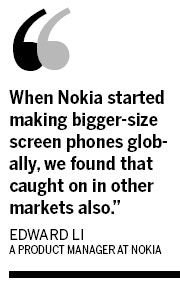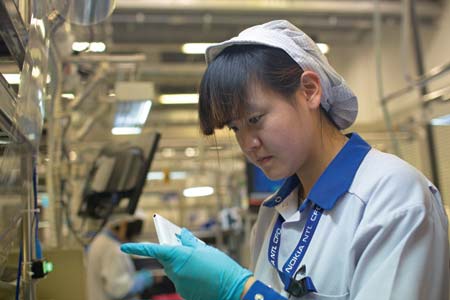Dialing into success from China
Updated: 2012-03-24 07:45
By Shen Jingting (China Daily)
|
|||||||||||
|
|
Nokia, from its base in Beijing, develops its products for the world
Lines and lines of shuttle buses are parked in front of the Beijing Economic and Technological Development Area in the Yizhuang region of southeast Beijing, which also contains the sprawling China campus of the Finnish telecommunications company Nokia Corp.
The 750,000-square-meter industrial center is a hub for telecom terminal manufacturing, employing more than 30,000 people. Most of them are either Nokia employees or work for companies that do large amounts of business with the Finnish company.
"You cannot imagine how bad the situation was in Yizhuang about 10 years ago," said Peng Jing, general manger of Nokia Telecommunications Ltd, a Nokia subsidiary.
Nokia was the first multinational company to set up in the Beijing Economic and Technological Development Area, says Peng, who joined the company in 1996.
"Ten years ago, before we broke ground, the area was a fish pond and had very few visitors," Peng said.
He said he cannot forget that first day, when mud, the product of rainy weather, was regularly splashed onto his pants.
Much has changed since then, Peng said.

Yizhuang now plays an important role in Nokia's research and development and is one of the few centers that has more than 1,000 employees working on those tasks. Last April, Nokia decided to make the Yizhuang campus its global innovation hub.
The move to Beijing came at a time when the Finnish company was floundering and losing considerable market share to its competition. To salvage its position, the company teamed up with Microsoft Corp in February 2011 to develop Nokia smartphones that could operate on the Windows Phone platform. Yizhuang has been chosen as one of four principal global hubs where innovations will be made to Nokia Windows Phone handsets.
"In addition to the development of Windows Phone products, the Yizhuang center will also continue to do R&D work on other Nokia phones," said Flann Gao, Nokia China communication manager.
He said the center is the only one of Nokia's operations that has a combined function.
Apart from research and development, Nokia has also worked to build up a complete industry chain for mobile phones in Yizhuang. The operations conducted at the technological development area range from design to production to shipping and warehousing.
To meet market demands, Nokia will also continue to make adjustments to its global handset business. But much of its plan to become a strong smartphone company will have to do with the center in the technological development area, says Markus Alitalo, who heads the Windows Phone research and development department in Beijing.
One of the reasons Nokia seems to be eager to put most of its eggs into the China basket could also be its plan to make further inroads into what is essentially the biggest mobile market in the world. By the end of February, China had nearly 1 billion mobile phone users, of which 143.6 million were 3G service subscribers or smartphone users.
According to a report issued by the Beijing-based research firm Analysis International, China is expected to have more than 300 million 3G users by the end of 2012. Many believe the expected increase in 3G users will result in huge opportunities for handset makers such as Nokia, experts said.
"Since most of our component suppliers are next door, the Yizhuang base is a convenient location for us to collect parts, assemble handsets and deliver them to Chinese customers as soon as possible," Alitalo said.
China is the biggest single market for Nokia, giving the company more than 5 billion euros ($6.6 billion) in net sales in 2011, according to its annual report.
The huge talent pool in Beijing is another reason for Nokia to strive harder in technological development. "Beijing has the most elite universities across China and we are excited to have them working in Nokia," Alitalo said.
"Though we are based in Beijing, we develop Nokia Windows Phones for customers around the world," Alitalo added.
Edward Li, a product manager at Nokia's Windows Phone unit, says certain ideas that were originated from China have been spread with considerable success to the global market.
He noted that Chinese customers prefer having mobile devices with bigger screens, whereas those in the US and Europe tend to like smaller screens.
"When Nokia started making bigger-size screen phones globally, we found that caught on in other markets also," Li said.
"The Chinese market has more or less changed the way Nokia does its business. Earlier it was the European or North American markets that set the trend for the entire mobile industry. But now, China is slowly exerting a bigger influence on the industry."
The Lumia 800 is the latest Nokia Windows phone developed in Beijing. The handset, marking Nokia's first collaboration with Microsoft and the Windows Phone 7 operating system, sold about 1 million units in the final quarter of 2011. Analysts expect Nokia to ship more than 37 million Windows Phone handsets this year and there is a good chance that most of them will have a connection to Yizhuang.
shenjingting@chinadaily.com.cn
Today's Top News
President Xi confident in recovery from quake
H7N9 update: 104 cases, 21 deaths
Telecom workers restore links
Coal mine blast kills 18 in Jilin
Intl scholarship puts China on the map
More bird flu patients discharged
Gold loses sheen, but still a safe bet
US 'turns blind eye to human rights'
Hot Topics
Lunar probe , China growth forecasts, Emission rules get tougher, China seen through 'colored lens', International board,
Editor's Picks

|

|

|

|

|

|






